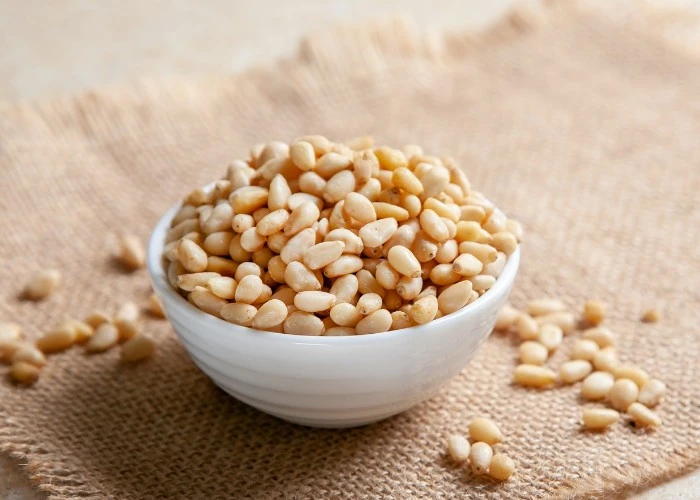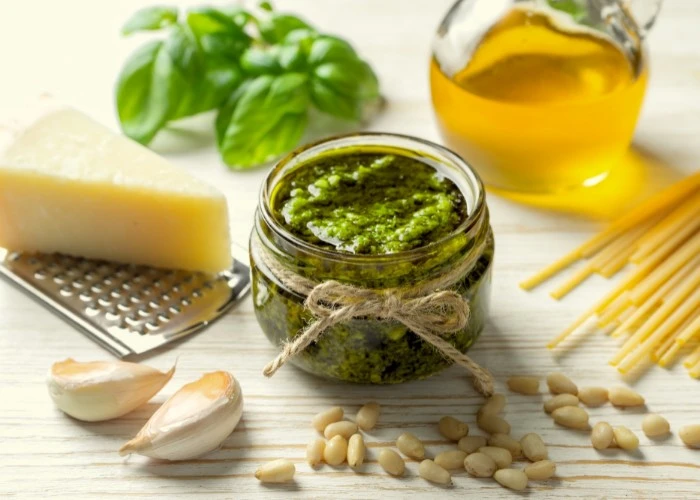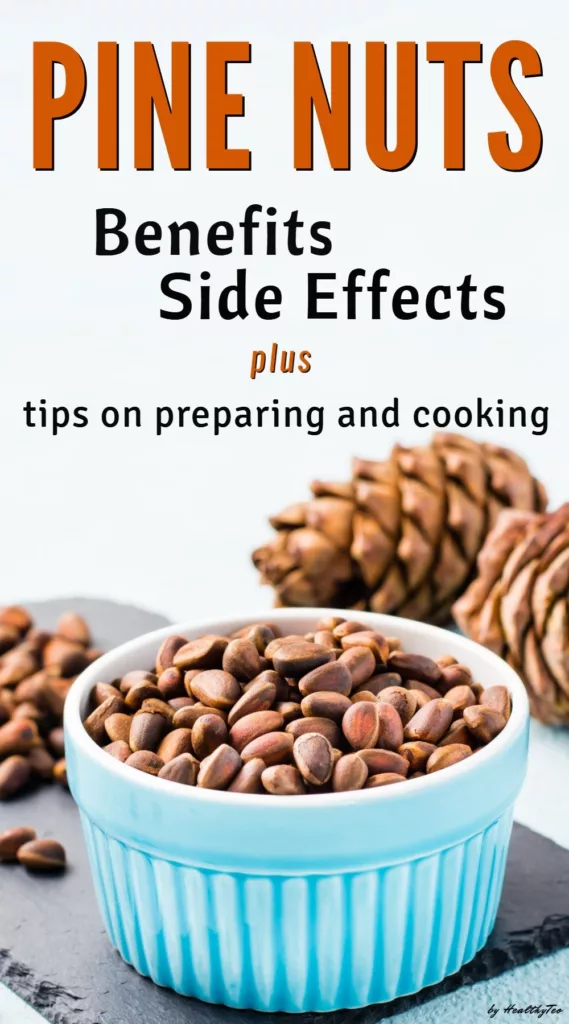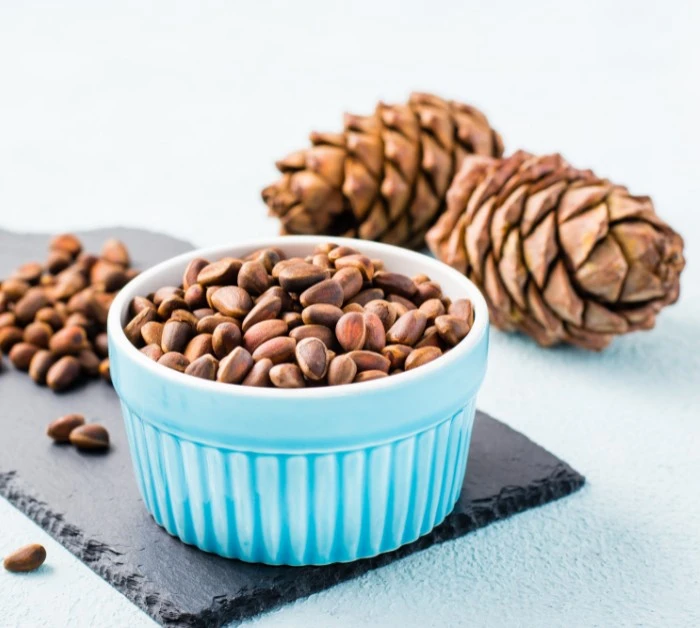Why pine nuts are good for you, potential risks of “pine mouth”, and how to use pine nuts for cooking
Adding pine nuts to your diet in moderation can be very beneficial for your health. Pine nuts may provide benefits like boosting energy levels, may reduce the risk of heart disease, may help protect your eyes and so much more that we will present you here in this article.
Not just the benefits of pine nuts, here you can also find out about the possible side effects of pine nuts such as so-called “pine mouth”.
Furthermore, we will show you how to use pine nuts for cooking and other interesting pieces of information related to pine nuts.
This post may contain affiliate links, which means we may receive a small commission, at no cost to you, if you make a purchase through a link. For more information, please see our disclosure.
What are pine nuts?
Despite their name, pine nuts are not actually nuts but are in fact the edible seeds from about 20 different species of pine cones. It’s perfectly acceptable to call them nuts or seeds.
Also called pignolia or pignoli nuts – pine nuts are often used in making pesto, in popular pignoli cookies, and in the cooking of other dishes. Nuts used in these dishes are commonly toasted briefly in a pan to enhance their rich, nutty flavor.
These are one of the more expensive nuts on the market because of the time required to grow the nuts and the effort to harvest the seeds from their protective encasement.
Approximately 20 species of pine trees produce pine seeds that are large enough to harvest. The most commonly harvested pine seeds come from 4 pine trees varieties – the Colorado pinion, the Mexican pinon, the Chinese nut pine, and the Italian stone pine.
It takes anywhere from 15 to 25 years for the trees to begin producing the seeds and up to triple that time for them to reach top production. The pine seeds are found in the pine cones and take about a year and a half to mature.
When ripe harvesters gather the pine cones, break them open, and separate the nuts from the pine cone fragments by hand. Pine nuts have a second shell that must be discarded before eating but can be difficult to remove.
This whole process, the lengthy ripening time, and shelling labor result in an expensive finished product.
Appearance and taste
Pine nuts are small seeds measuring about 1/2 inch long. They have a mild buttery flavor and a creamy texture more like macadamia nuts or cashews.
When blended into a sauce, dip, or pesto they contribute a more smooth, clingy texture than nuttiness.
To enhance the nutty flavor it is good to toast them before using them.

The nutritional profile of pine nuts
According to the USDA, 1 ounce (28 g) approximately 167 kernels, dried pine nuts provide:
- Calories: 191
- Fat: 19 g
- Carbohydrates: 3.7 g
- Protein: 3.9 g
- Fiber: 1.1 g
- Sugar: 1 g
- Calcium: 4.54 mg
- Iron: 1.57 mg
- Magnesium: 71 mg
- Potassium: 169 mg
- Sodium: 0.56 mg
- Copper: 0.74 mg
- Vitamin C: 0.22 mg
- Vitamin E: 2.64 mg
- Vitamin K: 15.3 micrograms
Pine nuts benefits
May help boost energy levels
One of the many things, why pine nuts are good for you, is because they are rich in monounsaturated fat, iron, and protein which can help boost energy levels. Furthermore, they are also rich in magnesium.
According to the National Institute of Health, magnesium is required for energy production. The iron present in pine nuts also plays a vital role. Iron helps your body to transport oxygen so cells can produce energy.
Iron deficiency is common and is associated with symptoms such as weakness and fatigue.
Beyond providing these essential nutrients pine nuts are also a good source of healthy fats and plant-based protein. Because of this, they may help you avoid the everyday energy crash by keeping you satiated.
Thus eating an adequate number of pine nuts can help you feel more energetic every day.
Pine nuts may help protect your eyes
Another important benefit of adding pine nuts to your diet is that they are rich in protective antioxidants.
Do you know that pine nuts and kale have one thing in common?
They both contain lots of lutein – a carotenoid antioxidant known as the “eye vitamin”. They also contain an antioxidant called zeaxanthin.
While there are over 600 carotenoids your body can utilize, just 20 of these are able to be transported to your eyes. Among the carotenoids present in the body only lutein and its coexisting isomer, zeaxanthin, are found in the portion of the eye where light is focused by the lens, namely, macula lutea.
Numerous studies have shown that lutein and zeaxanthin may provide significant protection against the potential damage caused by light striking this portion of the retina.
Clearly, these antioxidants are the key to maintaining healthy eyes. Some studies also indicate that those who have already suffered some macular damage can stop further damage by adding more lutein-rich foods into their diet.
Pine nuts are for sure one of those lutein-rich foods!
Reduce the risk of heart disease
Pine nuts contain a variety of nutrients that contribute to heart health and may lower the risk of cardiovascular disease. Nuts in general are always considered good for the heart.
Consuming just three servings or more of pine nuts or other tree nuts per week (compared to none) lowers the risk of heart failure and atrial fibrillation.
Consuming just one ounce ( about 28 g) of nuts a day may lower your risk of heart disease further.
As we mentioned pine nuts are a great source of monounsaturated fats. A healthy intake of monounsaturated fats has been linked to lower cholesterol levels and a lower risk of having a heart attack.
Pine nuts are also rich in vitamin K and E, magnesium, manganese, iron, and copper, all of which are beneficial to the cardiovascular system.
The vitamin K in these seeds helps to form blood clots to prevent bleeding from injury. Vitamin E helps produce red blood cells important for oxygen transport.
Furthermore, pine nuts are also rich in antioxidants and anti-inflammatory compounds that promote heart health in both the long-term and short term.
Helps mainatain healthy weight
According to the Nutrition Journal, people who eat tree nuts have lower body weight, body mass index (BMI), and smaller waist circumference than those who don’t.
Even though they are high in fat eating pine nuts (in moderation) on a regular basis can assist your weight loss effects. They contain pinolenic acid which was found to be an effective appetite suppressant.
According to a study published in the Journal of Functional Foods pinolenic acid have favorable effects on appetite control, perhaps by increasing blood concentration of key satiety hormones.
Therefore, when you eat pine nuts you feel fuller for a long time. As a result, you won’t feel the necessity of eating unhealthy snacks just to curb your appetite.
The fats and fiber present in pine nuts make them a satisfying food that reduces appetite and promotes healthy weight management.
Pine nuts may help support healthy skin
As we mentioned before pine nuts are loaded with vitamins, minerals, and antioxidants. All these are helpful for skin and hair care.
According to a 2012 review published in the Dermato Endocrinology vitamin E protects your skin from biological processes linked to aging of the skin. Pine nuts are a good source of vitamin E but they also contain zinc.
Zinc supports skin integrity and wound healing. Daily intake of zinc is important because the body does not store this essential mineral.
Pine nuts are also a good source of copper, an important mineral for collagen production. Collagen is a protein – the most plentiful protein in your body.
Your body has been making collagen your whole life. Collagen decreases as you get older contributing to wrinkles, joint pain, weakening muscles, etc. Aside from aging, the top reason people don’t have enough collagen is a poor diet.
Collagen production requires zinc, copper, vitamin C, and protein according to the Cleveland Clinic. Pine nuts contribute to your daily intake of all these nutrients.
According to all these, zinc, copper, vitamin E are beneficial to the skin because they improve skin moisture, reduce inflammation, help promote wound healing for burns and other skin lesions.
Furthermore, a body scrub created with raw pine nuts and coconut oil revives the skin by sloughing off dead skin cells.
Also, due to its excellent hydrating and moisturizing properties, it’s a recognized remedy for relieving dehydrated skin.
Improve brain health
In the same way that pine nuts improve circulation for heart health, they also supply essential nutrients to the brain.
Omega-3 fatty acids found in pine nuts can help build and repair cells in the brain. According to a study from 2019 increasing the nut intake of elderly adults boosts cognitive function and reduces depressive symptoms.
Furthermore, using pine nuts as a substitute for some of the saturated fats in your meal might be especially effective in promoting brain health.
Is it safe to eat pine nuts during pregnancy?
Eating pine nuts during pregnancy is safe. Pine nuts are high in fiber and this can help ease constipation which is one common issue during pregnancy.
Iron and protein present in these nuts are also beneficial, especially if the mother is a vegetarian. They also contain vitamin C which helps in the absorption of iron.
Remember to consume pine nuts in moderation. If you are pregnant it is best to consult with your doctor before consuming them.
These were the pine nuts benefits, but there are also some side effects of eating pine nuts that you should know!
Potential side effects of pine nuts
We’ve learned something about the pine nuts benefits, but are there any risks and possible side effects of consuming pine nuts?
Yes, there are some risks especially for people that are allergic to nuts. Like all nuts, pine nuts have been shown to cause allergic reactions. Pine nuts allergies can cause mild to severe reactions, including anaphylaxis.
If you’re allergic to pine pollen or peanuts, you may experience cross-reactivity to pine nuts. So, if you are allergic to nuts don’t consume pine nuts.
Risks of “pine mouth”
Another less common allergic reaction to pine nuts is known as Pine Mouth or pine nut syndrome. It’s not dangerous, but it is marked by a bitter or metallic taste “taste disturbance” after eating pine nuts.
This bitter metallic taste begins 2-3 days after eating pine nuts and lingers in the mouth for 2-3 weeks.
Despite a very big study conducted in France is still unclear what may trigger this side effect. According to this study, it may be due to some unidentified toxins present in some varieties of non-edible nuts.
The treatment for pine mouth is very simple, all that is needed is to stop eating pine nuts and the unpleasant taste should go away after 5 days, although in some cases it can take up to 42 days.
How to avoid pine mouth
According to research from 2010 pine mouth is suspected to be mainly caused by the Pinus armandii species from the Chinese white pine which has been considered an inedible species.
It may help to avoid pine nuts originating from China. Pine nuts not from China may cost more but may come without the risk of this side effect.
Also, a jar of pesto should be avoided as the manufacturer never label where the pine nuts may come from. There are many stories of people getting pine mouth from just eating pesto sauce.
Try to make your own pesto sauce at home so you will know that the pine nuts that you are using are of high quality.
How much pine nuts should I eat a day?
Despite the pine nuts benefits, eating too many of them may cause problems. It is recommended to eat no more than 30 grams ( one ounce) per day.
However, you should be aware of all the other foods you eat during the day to avoid consuming more calories than you need.
So it is best to eat up to 15 kernels of pine nuts in a day besides other foods or mix it with other nuts and dried fruits to enjoy a more energetic snack during the day.
How to use pine nuts
You can use pine nuts in any recipe that calls for nuts. Add pine nuts to granola, pasta dishes, baked goods, smoothie bowls, salads, and anything else that could use extra flavor and crunchy texture.

Many recipes require toasting the pine pints before using them. This is mainly because toasting them brings out a deeper nutty flavor. It is very easy to toast pine nuts.
You just need to heat a dry skillet over medium-low heat, then add the pine nuts and shake the pan frequently. Pine nuts can go from perfectly golden-brown to burned very fast. Burned pine nuts taste unpleasantly bitter, so be careful when toasting them.
Remove the nuts from the pan as soon as they turn golden-brown, and they also may burn if you leave them in the pan even if you turn off the heat. So, when they turn golden-brown immediately remove them from the pan.
If you don’t know how to incorporate pine nuts in your diet here is our suggestion, 20 crisp and crunchy pine nut recipes from Taste of Home.
And for the recipes, you can order pine nuts from Amazon here, like these Organic Pine Nuts grown in Russia, with great quality.
Tips on preparing and cooking
- If you are cooking for guests let them know that the meal contains pine nuts. Someone may be allergic to nuts.
- Blanched and silvered almond can be a great substitute to for pine nuts.
- Toasting pine nuts brings out the best flavor. Just be careful to nut burn them.
Best substitutes for pine nuts
There are several options that you can use as a substitute for pine nuts in recipes, such as:
- Cashews (chopped and toasted) – cashews work well as a substitute for pine nuts in pesto.
- Almonds (toasted, sliced) – they work in pesto as well as pastas and salads.
- Pistachios – you can use them for pest, pasta or salad.
Just remember that the unique flavor of pine nuts can’t be replicated.
So for recipes with pine nuts try to use them to get the unique flavor and taste. But for some reason, if you can’t feel free to use these previously mentioned substitutes.

Final thoughts about the pine nuts benefits, side effects and how to use them
Eaten in moderation pine nuts are good for you. Pine nuts are rich in vitamins, minerals, and other nutrients vital for your health.
From the pine nuts benefits, researchers confirmed that they are good for maintaining a healthy weight, may help protect your eyes, may boost energy levels, reduce the risk of heart disease, plus improve skin health.
Despite the fact that adding pine nuts to your diet is beneficial for your health, you should eat them in moderation, no more than 30 grams per day. Also, be aware that there are some side effects related to pine nuts.
For the side effects, you should be aware of the allergic reactions. If you are allergic to nuts avoid consuming pine nuts too. Another common side effect of eating pine nuts is the so-called “pine mouth”
As we explained up here it is usually caused by consuming Chinese pine nuts, and it is not dangerous but you will have a bitter or metallic taste after eating pine nuts.
This metallic or bitter taste in your mouth begins 2-3 days after eating pine nuts and can stay for about 14 days.
The best thing to do to avoid the so-called “pine mouth” is to avoid consuming Chinese pine nuts.
When cooking with pine nuts try to buy quality pine nuts that are not from China to avoid the “pine mouth”. It is good to toast them before cooking to enhance the flavor.
Remember that many people are allergic to nuts. If you share a meal containing pine nuts inform the other person that your meal contains pine nuts.
Pine nuts are a delicious addition to many dishes. Add them into your diet to reap all the benefits but use them in moderation!
Read next
Different Types of Edible Seeds That You Should Add Into Your Diet




